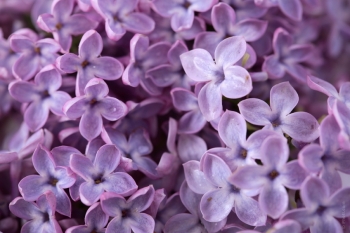My mother loved gardening. When I was a child, she told me all the names of the different plants, trees, and flowers around our home and as we walked about in the world. “This is a hollyhock, honey. And look—these are peonies!” I, however, wasn’t interested in flowers. Being raised in the suburbs, I only knew manicured lawns and annuals planted each spring, punctuated by the occasional trip to my godmother’s house, a five-hour drive away, “in the country.” I could never understand why my mother found so much pleasure digging in the garden. She even set up floodlights so that she could work after dark, when all the sane gardeners had gone inside. It made her happy, but to me it just seemed like work.
FEATURES|COLUMNS|Mindful Living (inactive)
Lilac Meditation
Buddhistdoor Global | 2015-06-05 |
 From photl.com
From photl.comFast forward to my university days in Montreal where the winter is long and the spring cause for great celebration. I remember biking home one day when I noticed the lilacs in bloom. I stopped and got off of my bike just to smell them, and smiled. This was a new thing for me, but the combination of the long winter and the pale glow of their particular hue, closer to blue than to pink, drew me. I did not yet know how to stop and smell the roses but I spontaneously began stopping to smell the lilacs. They only lasted a few weeks so I had to enjoy them while I could, and enjoy them I did.
Most of the natural world, however, still felt pretty cut off for me, though I knew it was important to many. I even remember walking through my local park thinking, “What do they feel, these people who are into nature?” A few years later I encountered the practice of mindfulness. Along with cultivating awareness of breathing to calm myself down, I found that I was also cultivating a living connection with the natural world. When I walked through that same park, noticing my breathing led to noticing my body which led to noticing the world around me. I started noticing the sunlight dancing on the leaves as I walked to the bus stop. After a very short time, I started to feel an aliveness in the world around me. I didn’t walk particularly slowly. I didn’t develop a particularly concentrated mind, either. Still, something felt different. As I noticed the world around me, the world started to change. It wasn’t a forced effort, but rather a natural shift over time.
Now, when I look back over the dozen years I’ve been practicing mindfulness, I can see a lot of changes in my life. One of the biggest changes is in my relationship to the natural world. I don’t wonder what those “nature lovers” feel anymore. I have my own love story going on with the world because when I’m truly present for myself, I’m present for everything and everyone. The sound of the birds singing or a sunset that I might not have noticed in the past have now become reasons to stop and enjoy, if only for a few breaths. The ordinary things in life are still ordinary, but in the ordinary lie a myriad of opportunities to take delight in in this very life. Even when the world feels like it’s falling apart, there is always something to take delight in.
I must emphasize that there is a fine line between acknowledging one’s pain and delighting in the wonders of life anyway, versus denying one’s suffering and pretending to be happy. I’ve talked with a lot of people recently who’ve been wanting to know how to tell the difference. First of all, I tell them that there is no fixed rule. You have to try it out and get to know yourself so that you can tell when you’re repressing and when you’re letting go. I’m still figuring it out but I can tell you that it gets much easier with practice. If there’s tension in the body, that’s usually my first sign that I’m avoiding rather than releasing. That’s why we call it a practice. Sometimes, when I’m really stuck in a dark place, I just ask myself if within this darkness I can still enjoy the beauty around me, if only for one breath. And now I can usually say “yes.” Just one breath of release is already enough to change a negative cycle of thinking before it runs away with itself.
Fast forward to the present. I am in Montreal with a group of monks and nuns offering retreats and public talks on mindfulness practice. It’s springtime and the lilacs are in bloom. The memory of stopping on my bike to enjoy the lilacs so many years ago comes back to me with full force. I reflect on how I’ve been transformed by this practice over the last 12 years, and how surprising each turn of events has been. I am still sometimes surprised that I’ve become a nun! Walking this morning, I again stop to enjoy the neighbor’s lilacs, to look at the petals, to smell their delicate aroma, to enjoy their presence before they fade again for another year. I want to say that they’re even more alive to me now, but I can’t say that for sure. I do know that their simple existence is reason enough to delight.
May you recognize the wonders of life that surround you.

Categories:
Comments:
Share your thoughts:













